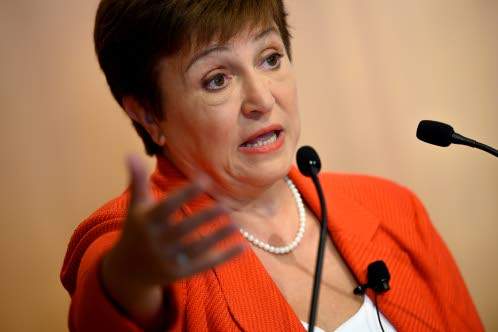AS the world braces itself for a deep recession in 2020, having in place strong capital and liquidity positions to support fresh credit will be essential to economies, according to International Monetary Fund (IMF) Managing Director Kristalina Georgieva. This, she believes, will significantly strengthen the resilience of a country’s financial system during and post-COVID-19.
Citing the 2008 financial crisis wherein global regulators required banks to increase their prudential buffers of high-quality capital and liquidity to strengthen economies as a success, Georgieva indicated that one of the steps needed to reinforce bank buffers is the retaining of earnings from ongoing operations.
“These are not insignificant. IMF staff calculate that the 30 global, systemically important banks distributed about US$250 billion in dividends and share buy-backs last year. This year they should retain earnings to build capital in the system,” she contended.
“Of course, this has unpleasant implications for shareholders, including retail and small institutional investors for whom bank dividends may be an important source of regular income. Nonetheless, in the face of the abrupt economic contraction, there is a strong case for further strengthening banks’ capital base,” Georgieva maintained.
But according to her, this points to a greater good as building stronger buffers is aligned with the array of actions undertaken to stabilise an economy.
“Governments are deploying fiscal measures in trillions of dollars, including financing that provides a backstop for borrowers who are tapping bank loans. Central banks have innovated and provided extraordinary liquidity support to a wide range of markets. Bank supervisors have exercised flexibility to the fullest possible extent by encouraging banks to restructure loan repayments, easing regulatory requirements, and allowing banks to draw down their buffers temporarily,” she added.
However, while the interests of bank shareholders are aligned with those of bank supervisors and customers. She reckoned that all stakeholders will ultimately benefit if banks preserve capital instead of paying out to shareholders during the pandemic.
Protecting the banking sector’s strength now means that, once the recovery picks up, shareholders can expect large payouts.
“Memories from the last global crisis still linger. The public sector is doing what it can to help prevent another banking crisis from happening again. Shareholders have both an interest and an obligation to do the same. Shareholders who sacrifice now will prosper when growth restarts” Georgieva proclaimed.
STAKEHOLDERS NOT PLEASED
The need to preserve capital is already being recognised as in early May, the Bank of Jamaica (BOJ) issued an advisory on a suspension of dividends for the 2020 financial year by financial holding companies and deposit-taking institutions.
The central bank said it stands ready to provide liquidity and other support necessary to ensure that financial institutions can continue to provide credit and other financial services to the public, limit the potential negative economic repercussions on the lives of ordinary Jamaicans, and preserve confidence in the Jamaican financial system.
However major players in the financial sector, namely chairman of Mayberry Investments Chris Berry, cautioned against the suspension as it could also scare away potential investors.
“From my perspective I think it’s a bit risky because one of Jamaica’s biggest problems is attracting investors, and I think that once you start determining whether investors can get their dividend — which is why they are investing — then it’s [a] kinda double jeopardy situation,” Berry stated at Mayberry’s virtual investor forum held recently.
While acknowledging the intent of “trying to protect the national economy and the foreign exchange rate”, he pointed out that potential investors will reconsider investing if they’re unable to receive dividends.
The Opposition spokesman on finance Mark Golding has also called on the BOJ to review the policy, stating in a press release several reasons his party does not regard the “blanket ban on dividends as being a sound approach to this economically sensitive matter”.
This included the effect of the suspension on small shareholders and pension funds, dwindled confidence in the Jamaican stock market, and lack of legal framework governing said dividends policy.
In the meantime, Sagicor Group Jamaica recently announced its intent to pay declared dividends to shareholders with shareholdings of one per cent or less as at April 24, 2020. This is, however, subject to the consent of the shareholders who currently hold more than one per cent of the shares of the company, and this approval is currently being sought.
Sagicor had postponed its previously declared interim dividend payment of 40 cents per stock unit due to the suspension advised by BOJ.
Regarding its intent, Sagicor said the BOJ has indicated it will not object should the company decide to pay dividends to shareholders with one per cent or less shareholdings, and will soon advise the company on when it is appropriate to do so.




Leave A Comment